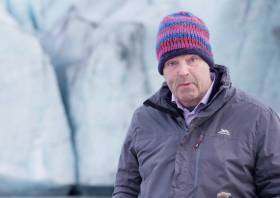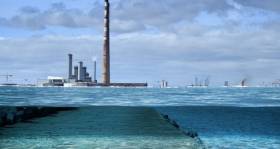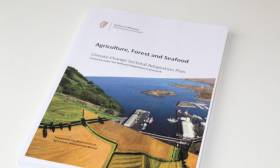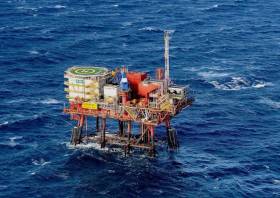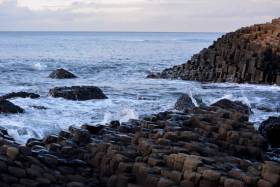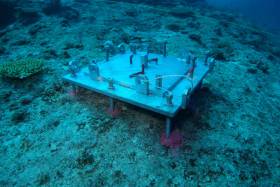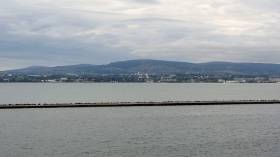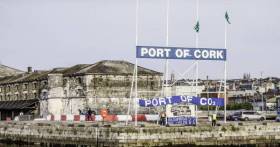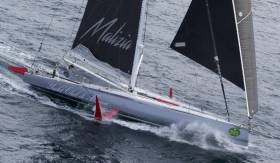Displaying items by tag: Climate Change
“The sea will come and take” Dublin and Cork by 2050 if nothing is done to deal with the consequences of climate change, Gerald Fleming will say in an RTÉ TV documentary tonight as The Irish Times reports.
The former weather presenter and head of forecasting at Met Éireann adds that the port towns of Drogheda, Galway, Limerick, Waterford and Wexford are also particularly vulnerable to rising sea levels, increasingly severe weather, more frequent storm surges and extreme flooding.
Fleming explores the direct effects climate change has already had on the likes of Greenland, while he and researcher Cara Augustenborg will present computer models that show the damage that could be caused to Ireland in the not too distant future.
Will Ireland Survive 2050?, part of RTÉ’s new On Climate season, screens tonight (Monday 11 November) at 9.35pm on RTÉ One. Fleming tells more about the programme at RTE.ie.
The Irish Times writes, that a catastrophic storm during high tide will leave thousands of homes, businesses and landmark buildings in Dublin under water is inevitable over the coming decades, one of the country’s foremost climate change experts has warned.
Prof Peter Thorne said Ireland had been lucky to “dodge a bullet” until now during major storm events – because they have struck during low or neap tides – but it was only a matter of time until the elements combined for a devastating surge.
The Maynooth University academic, who was lead author on the fifth assessment report of the UN’s Intergovernmental Panel on Climate Change, and is aged 40, said he expected a major high tide flood event in his lifetime.
In the capital this would mean water from Dublin Bay surging into the Liffey while it was in full flow from the Wicklow mountains.
More on this story by clicking here.
Government Approves Agriculture, Forest & Seafood Climate Change Sectoral Adaptation Plan
Marine Minister Michael Creed, yesterday (Thursday 31 October) welcomed Government approval for the Agriculture, Forest and Seafood Climate Change Sectoral Adaptation Plan to prepare for the impacts of climate disruption.
“I am very pleased the Agriculture, Forest and Seafood Climate Change Sectoral Adaptation Plan has been approved as part of the Whole-of-Government approach adopted under Climate Action Plan 2019,” he said.
“We have taken a consistent approach to adaptation planning across the Department [of Agriculture, Food and the Marine] and have prepared a single plan covering the agriculture, forest and seafood sector.”
Th minister added: “In addition to reducing our emissions, we must ensure that our food production system is resilient and ready to adapt to future climate risk.”
Minister Creed described the plan approved today as “an important next step in our goal to build a strong and resilient sector that is well placed to take on the challenges and opportunities presented by our changing climate”.
The Adaptation Plan highlights a number of case studies identifying how the sector has and will continue to be impacted by changing weather patterns and steps towards building resilience.
The plan and its associated documents are available on the DAFM website HERE.
Government Agrees Terms For Oil Exploration Ban
Seán Canney, Minister of State for Community Development, Natural Resources and Digital Development, has confirmed the policy principles that will underpin the Taoiseach and Minister Bruton’s announcement to cease new exploration for oil offshore Ireland.
This announcement, in an address to the United Nations Climate Action Summit on 23 September, came on foot of advice received from the Climate Change Advisory Council on what the future of oil and natural gas offshore exploration should be in the context of the recently published Climate Action Plan.
The council noted that the plan envisages a major shift away from oil combustion within heat and transport sectors towards renewables in the coming decade. Therefore, the council advised that the exploration for, and recovery of new offshore oil reserves, is not compatible with a low carbon transition.
The council further advised that the continued exploration for and extraction of new offshore natural gas reserves can be consistent with a low-carbon transition.
Gas is considered to be a transition fuel. This is particularly the case for Ireland, the Government says, where we do not have nuclear power, hydro power at scale or geo-thermal power, which other countries can use to provide back-up for wind and solar power.
The Government asserts that natural gas, as the lowest emitting fossil fuel, will provide the best electricity back up in 2030 when Ireland reaches 70% renewable electricity.
The minister will commission an Energy Sustainability and Security Review which will consider the role of fossil fuels during the transition. It will also consider the role that other technologies can play.
Minister Canney confirmed yesterday (Wednesday 30 October) the following principles in relation to petroleum exploration in the Irish Offshore:
- All future licencing rounds in the currently closed area offshore (Atlantic Margin, 80%) will be for natural gas only and not oil.
- All new licence applications in the currently open area (Celtic Sea, Irish Sea, coastal areas, 20%) will be for natural gas only and not oil, applicable from the day of the Taoiseach and Minister Bruton’s announcement on 23 September.
- All applications and authorisations in place before the announcement was made will not be affected by the decision.
The minister has asked the department to prepare a policy statement which will set out:
- The basis for the underpinning principles in the broader context of the Government’s Climate Action Plan;
- The future development management framework for the exploration and production of gas, as a transition fuel, in Ireland’s offshore; and,
- The role of natural gas in ensuring Ireland’s energy security.
“These principles underpin the Government’s decision for no new oil exploration offshore Ireland. They provide further clarity on the implementation of this decision and are consistent with the Climate Action Plan published by Government on 17 June 2019,” Minister Canney said.
“The Climate Action Plan puts Ireland on a trajectory to meet our 2030 target for carbon emissions, which is consistent with achieving net zero carbon emissions by 2050.”
Minister Bruton added: “Over the next decade, we will rapidly reduce our reliance on fossil fuels as we move to 70% renewables.
“The Government sought advice from the Climate Advisory Council on exploration in the context of this transition and has accepted that advice to ban new oil exploration off Irish coastal waters. Today we agreed the terms of that ban.”
Minister of State Ciarán Cannon has announced €4 million in funding to the Ocean Initiative, which supports research for small island developing states in the area of coastal and marine management.
Speaking ahead of the Our Ocean Conference in Oslo, Norway last week, the Minister of State for Diaspora and International Development said: “Building on Ireland’s previous commitments, this year I am proud to commit €4 million to a newly established Ocean Initiative.
“This initiative will provide short-term capacity support to small island developing states (SIDS), and fund long-term collaborative research between Irish counterparts, private sector or academics, and SIDS in the area of coastal and marine management.”
The new initiative is part of Ireland’s recently launched Strategy for Partnership with SIDS and will help meet commitments made in A Better World, Ireland’s policy for international development, to address climate change and protect our marine environment.
Minister Cannon added: “This conference is a welcome opportunity for Ireland to engage with representatives of international governments, business, NGOs, foundations, research institutes and international organisations in presenting commitments that will contribute to the protection and sustainable use of the world’s oceans.”
‘Mixed Picture’ Of Health In Seas Around Northern Ireland & UK
A new review of the state of the seas off Northern Ireland and the UK reveals a ‘mixed picture’ in terms of biodiversity, as BBC News reports.
While the UK Government’s marine strategy assessment had good things to say about reduced contaminants in seawater and seafood caught around UK shores, marine litter remains a problem, as does the impact of climate change.
It also noted that seabird populations are particularly at risk, and that more studies were needed to evaluate the health of the likes of whales and dolphins.
“Fifty per cent of biodiversity in Northern Ireland is actually below the sea,” said scientific officer Helen Hanratty who helped put the report together.
BBC News has more on the story HERE.
An ‘Irish ocean observing system’ is among six research projects to receive €25 million in funding through the Science Foundation Ireland (SFI) Research Infrastructure Programme.
Innovation Minister Heather Humphreys yesterday (21 October) announced the investment as part of Future Jobs Ireland that will be distributed among the six infrastructure projects “in areas of strategic priority across a variety of disciplines”.
Mr Michael Gillooly of the Marine Institute is lead on the EirOOS Irish Ocean Observing System, a component of the European Ocean Observing System (EOOS) that aims to further scientific and technical research capacity in key areas such as sea level science, ocean circulation and carbon sequestration, allowing us to better understand the connection between Ireland and the Atlantic.
Announcing the awards, Minister Humphreys said: “The quality of research being undertaken in Ireland today is testament to our world-class research community. This talent combined with the support provided through programmes like this one maintains our reputation as a great place to do business and work.
“The successful projects are at the cutting edge of innovation and are helping us to achieve our goal of preparing now for tomorrow's world.”
The SFI Research Infrastructure Programme aims to ensure Irish researchers have the capacity to apply for international funding opportunities, including Horizon 2020 funding calls.
Additionally, the programme eases inter-institutional sharing of national research infrastructure, especially for institutes of technology, as well as effective collaborations with industry.
Welcoming the investment in EirOOS, new Marine Institute chief executive Dr Paul Connolly said: “Sustainably managing our oceans and understanding the impacts of ocean and climate change, requires increased observations on and within the ocean.
“These observations underpin research and advice to support policy makers in sustainably managing our oceans and also in developing adaptation and mitigation plans for climate change impacts.
“The investment in the EirOOS infrastructures will enable enhanced ocean observation and underpin forecasting and modelling in the marine area.”
Climate Action Report Claims Dublin Bay Sea Level Rising Faster Than Forecast
Dublin Bay’s sea level seems to be rising faster than forecast — and at twice the global average over the past two decades.
The Irish Times reports on this startling claim from Dun Laoghaire-Rathdown County Council’s (DLRCoCo) climate change action plan, which also notes that weather extremes are “likely to increase in their frequency and intensity”.
The report comes following one of Ireland’s hottest summers on record, itself just months after a first ever Status Red warning for snow was issued by Met Éireann.
Three Dublin local authorities launched their climate action plans on Monday (9 September), with DLRCoCo’s plan pledging to “prioritise nature-based flood defences where possible” over the next five years.
The Irish Times has much more on the story HERE.
Campaigners Extinction Rebellion Targets Port of Cork Demanding Action on Climate Change
Campaigners for the environment, Extinction Rebellion have targeted the Port of Cork in their latest protest.
According to EchoLive.ie, signs emblazoned with slogans such as "Port of CO2" and "Business as Usual??" were attached to the Port of Cork sign at Custom House Quay.
The group said the action was carried out in a non-violent and non-destructive way.
Extinction Rebellion is an environmental movement aiming to draw public and government attention to the need to tackle climate change.
In April and July, the group staged ‘die-in’ protests, on Oliver Plunkett Street and outside City Hall, where participants symbolically played dead to mimic an apocalypse.
The protest group is adamant that radical action must be taken to immediately halt biodiversity loss and reduce greenhouse gas emissions to net zero by 2030.
Click here for more on the story.
Young Climate Activist Greta Thunberg Plans Zero-Carbon Journey By Sail To UN Conference
Young climate activist Greta Thunberg is taking to the high seas as she plans a zero-carbon journey from Europe to a UN climate summit in New York this September.
As RTÉ News reports, the 16-year-old Swede intends to cross the Atlantic on Boris Herrmann and Pierre Casiraghi’s Monaco-based 60ft Mono60, Malizia II, which has previously competed in the Rolex Fastnet Race.
The foiling vessel is equipped with solar panels and underwater turbines to generate energy at sea.
It will also bear the slogan ‘#Fridays for future’ inspired by Thunberg’s regular Friday protests against climate inaction at the Swedish parliament.
Thunberg refuses to fly due to the negative impact of commercial aviation on the environment.
RTÉ News has more on the story HERE.


























